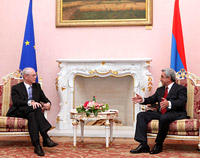On July 4 the president of Armenia, Serzh Sargsyan made a very interesting announcement during a briefing with the European Council head Herman Van Rumpey, which did not receive an adequate feedback by media. This announcement should have been discussed especially by the media sources focused on economic issues.
MediaMax reports that during the above mentioned briefing Serzh Sargsyan said, “Recently I participated in the summit of the heads of the states of the European People’s Party. The main topic of the discussion was the financial tense situation in the Euro zone and the possible ways out. Economies of small countries are vulnerable especially in such tensions, and we are expecting that as an Eastern partner we will receive our portion of efforts to meet those challenges.”
At first glance there is nothing strange in it. It is very normal that as an Eastern partner Armenia is expecting support from the European Union. However, the manner is not understandable because it sounds like “you are the ones who made this soup, you should be the ones to help us eat”. In the meantime, the president speaks of the results and impact of the Euro zone crisis on Armenia in a manner that it is already a fact. Let’s not forget that even one month has not passed since the president petitioned the government to provide higher economic growth than during the previous year and reach the level of 7%. The most interesting thing is the change in the tone of the president. In the end of the previous year his tone was different. In October 2011 the president spoke at the forum in participation of Armenia’s agriculture communities in Jermuk, where he said that the participants should not even complicate the economic situation with conversation about possible repetition of the crisis. With those words the president indirectly answered to the announcement of the World Bank Armenia office Jean-Michel Happi, who had said that one of the risks for Armenia’s economy continued to be the crisis and instability in Euro zone. In answer to this statement the president said that it was soon to speak of the second wave of the crisis. “It is soon to speak about difficulties created by the crisis and transformation to a second phase. Certainly there are difficulties, but we are used to working in difficult situations and we are ready to face challenges,” said Serzh Sargsyan.
Now it turns out that the difficulties in the European markets are causing visible difficulties for the Armenian economy. Second, it turns out we are not ready to face the challenges, or we cannot resist alone and we are expecting financial support.
Notwithstanding all this panic, the officials of the government were assuring during the presentation of the government’s program that the government administration would be based on domestic resources and development driven by domestic resources.
By the way, ten days after Serzh Sargsyan’s announcement in Jermuk the prime-minister came up with another announcement at the Eurasia Economic Partnership intergovernmental session. “Currently the main problem we worry about is the crisis expected in 2012. If in 2009 the world crisis affected our economy mainly through the sector of construction resulting in 43% slump, currently we mostly worry about the crisis to come in 2012. We should understand how it may hit our economy. Our consultations with the World Bank, International Monetary Fund and other international organizations do not give the answer to this question and we don’t know what the impact of a possible international economic crisis may affect our economy. One of the main questions we have is that whether we will be able to have more than 4% economic growth next year. Mainly this is connected on the expectations from investors and money transfers to Armenia,” said Tigran Sargsyan.
Looking back on speeches of officials back several months ago, we come to very interesting conclusions. It turns out that at the time when the government did not relate seriously to Euro zone crisis impact on Armenia’s economy, the government was planning a modest economic development rate around 4% (even the prime-minister was suspicious whether this level could be reached). And now, when the dangers and risks are so visible and close and we expect financial support from the EU, the economic development expectation is being revised and increased to 7% economic growth.
There is a very interesting coincidence in all the above said. Looking at the timeline, October is the most contradicting month. In October 2008, when everyone was speaking of the world crisis, the prime-minister was petitioning people not to exaggerate its impact on Armenia. Last year during the same period the president of the country made a similar announcement. From this prospective, October is going to be a very interesting period this year and we expect that there will be more contradicting announcements.

